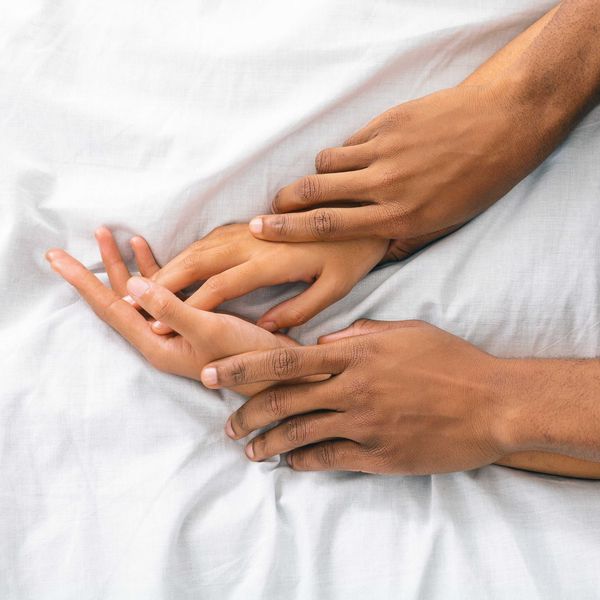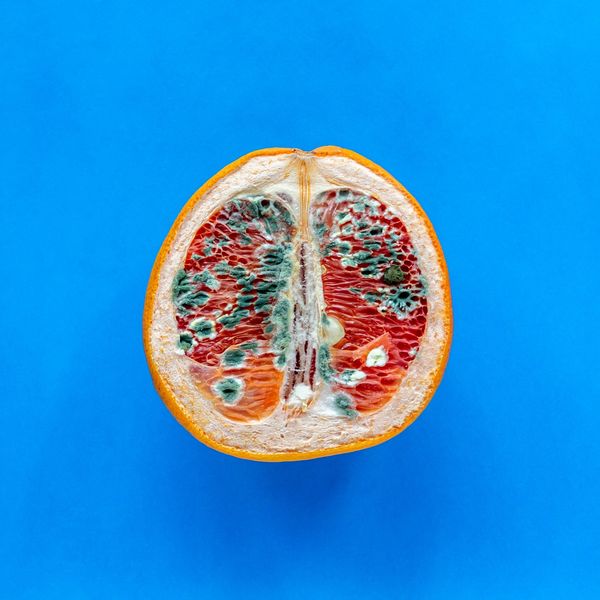This is one of those things that a lot of us experience but don't necessarily discuss out in the open. I think a part of the reason is because there is a natural assumption that if something is itchy down below, especially when it's connected to sexual activity, we naturally think that something is "wrong." As you're about to see, though, there are quite a few reasons why you could want to scratch the mess out of your vagina following a rendezvous with your partner. The good news is, through the process of elimination, you can probably get to the root of the issue and find relief in no time.
1. A Condom Allergy
I once read that 1 in 6 women are allergic to latex condoms, so if you're someone who doesn't like to use them because you feel uncomfortable (itching, swelling, tenderness) afterward, it's probably not "in your head." At the same time, that's not a good enough reason to go without using one. When you get a chance, check out "Allergic To Condoms? Try This.". In it, I've provided some rubber alternatives that are just as effective yet far less irritating.
2. You Weren’t Wet Enough During Sex
It might surprise you (or it might not) that your actual vagina (the inner tube that connects to our cervix which is basically the "neck" of our uterus) isn't super sensitive. Praise the Lord for that because babies come through there (for a lot of us)! However, what is sensitive is your vulva (the outer part of your vagina); I mean, your clitoris alone has double the number of nerve endings in it as a standard penis does (it's got 8,000 of 'em)! Still, if you don't have enough lubrication in that area, it can also lead to vaginal itching after sex because of all of the friction without enough "liquid support."
This means that, yes, your partner needs to keep their foreplay game strong. Also, you might need to bring some lubrication into the picture. Hey, ain't nothin' wrong with that. They don't say "the wetter, the better" for nothin', chile (check out "The Wetter, The Better: 10 Creative Ways To Use Lubricant").
3. Your Body Is Adjusting to New Sperm/Semen
Many years ago, I checked out a video from an older Catholic woman who studies what sex can do solely to a woman's body (you can check it out here). Of course, she's coming from a biblical perspective which means she's trying to encourage people to wait until marriage. Still, some of her straight science points are worth listening to. One of them has to do with the fact that when we have unprotected sex with two different men within (I think) 48 hours, it's not uncommon that we will catch a cold because our body will literally abandon our immune system in order to get one of those sperms out of our system because it sees it as being "foreign."
When I was in a really strange place sexually, many years ago, I had unprotected sex with three different exes within a week. While I didn't catch an STI/STD, my vagina was PISSED because, I now know, it didn't know what to do with two of those joker's semen and all of that "congestion" threw my pH balance off (more on that in a bit). So, if you've got a new partner and for some reason, after sex, things feel itchy down there, his semen could be why. Usually, things will get better over time, but you might get a yeast infection (more on that in a sec too) before it does. Just a heads up.
4. “Dirty Fingers”
I know there are plenty of television shows and movies where folks just walk into the front door and start getting it in and on; however, for the sake of your vagina, try and make sure that both of you wash your hands first. The reality is there are somewhere around 1,500 living bacteria per every square centimeter of your hands and a whopping 20 billion microbes in your mouth at any given time too. When your partner is touching and kissing you, those numbers double and although your vagina has good bacteria to fight the bad and your saliva is pretty damn strong, you don't want to weaken either by unnecessarily bringing germs 'n stuff into the picture. So yeah, the cleaner you and your partner's hands (and nails) are prior to sexual activity, the less you'll have to worry about scratching after he puts his hands into places that he's never seen (cue Usher).
5. Strong Chemicals in Your Lubrication
Some of y'all might remember the episode of Soul Food when Lem and Byrd tried a new massage oil that they ended up being allergic to that had them damn near about the scratch their skin off. Yeah, the amount of chemicals that are in some of these lube brands is totally off the charts! That's why, it's important that you go with something that typically has water as the first ingredient (because whatever the first thing that's mentioned on a label is, that's what a product has the most of). Also, you may want to, at least skim, "Lube Lessons 3: The Sex Lube Ingredient Glossary" because it offers up a full list of the kind of chemicals that are in different lubricants and how they could very well affect your body — so much to the point that you might want to end up making your own.
By the way, there is absolutely ain't nothin' wrong with doing that. Just make sure that you avoid putting any oil in your DIY because that can cause your condoms to lose their effectiveness. Anyway, The Dating Divas has a list of 10 different lube recipes that you can check out here.
6. A Yeast Infection
OK, off the rip, you might be thinking, "Isn't it a given that a yeast infection would cause itching and why would I have sex while I've got one?" While both of those are certainly good questions, there are three things to keep in mind. First, you may have a yeast infection with symptoms that are new (including the itching). Two, you might've known you had one but miscalculated how long you've been treating it and the sperm, condom, and friction further aggravated your infection while your body is still trying to heal. Or three, your partner could have one, and either you've been swapping it back and forth or he is totally unaware.
As far as the third point goes, if your partner has itchy penile skin, a thick white substance on the folds of his penis (especially if he is uncircumcised), or there are areas of his penis that are super shiny and/or white and/or irritated, he definitely should get it looked at because yeast infections typically don't go away on their own and until there is a cream and/or antibiotic administered, it's just gonna keep driving you and/or him insane. By the way, you can get an oral yeast infection (keep that in mind when it comes to oral sex). Also, you should wait until your prescribed medicine is fully completed before "engaging" again. If you really want the itching to stop, I mean.
7. Your pH Balance Is Off
When you get a chance, check out "Sis, This Is How To Keep Your Vagina's pH Balanced." One of the things that I mention in it is your vagina should be somewhere between 3.8 and 4.5. That said, sometimes all of the things that I've already mentioned that transpire during sex can throw your balance off and that can also cause your vagina to get all itchy and irritated. In case you're wondering, some semi-quick ways to bring balance back to your vagina include taking a probiotic, eating some unsweetened yogurt, using non-irritating condoms, consuming some garlic, and chilling out (yes, literally; stress can irritate your vagina over time too).
8. Your Vulvar Eczema Is Triggered
If you didn't know, vulvar eczema is a real thing. It's what happens when the outer area of your vulva and/or your buttocks are affected by eczema which can lead to the same scaly skin and dry patches that eczema elsewhere tends to create. As far as what initially triggers vulvar eczema, most health professionals connect it to things like an allergen or irritant which could again be condoms, your partner's sperm/semen, lubes, fragrant soaps or perfumes, or even a super harsh detergent that you wash your panties, bras, and lingerie in.
While it's best to get an official diagnosis from a medical professional, it's a good idea to keep in mind that emotional stress and a family history of eczema can also lead to eczema-related symptoms. Oh, and as far as treatment goes, applying a corticosteroid cream for a couple of weeks a couple of times a day can typically bring some much-needed relief (still, go see a doctor to make sure that eczema is actually what's going on).
9. You Waited Too Long to Rinse Off/Wash Up
Ain't nothin' better than spooning after sex (I remember it well). Still, if you decide to lie in that "wet spot of love" all night long, it could lead to infections (including UTIs, believe it or not). That's why it's a good idea to try and urinate after sex. Oh, and while you don't necessarily have to get into the shower (check out "So, This Is How To Make Shower Sex So Much Better"), run a wet washcloth over your vulva before getting back in bed. It will remove some of the bacteria so that you won't have to worry (so much) about your vaginal area feeling irritated later on.
10. An Undiagnosed STD
According to the Centers for Disease Control and Prevention, there are currently 1 in 5 people in the United States who currently have some type of STD. If that isn't enough of a reason to get regularly tested (if you are sexually active), I don't know what is. That said, there are several of those bad boys that can lead to vaginal itching including trichomoniasis, chlamydia, gonorrhea, genital herpes, and genital warts.
So, if it's just recently that you've been itching during sex and it's been over a year since you've been tested, there's no time like the present to book an appointment (or to take a test at home if that would make you feel more comfortable). STDs are nothing to play with, so you definitely shouldn't "Google your way" into a remedy. Not just so the itch can stop but so you don't end up with more serious complications up the pike. Feel me? Good.
To learn more about all things vaginal health and wellness, check out the xoNecole Women's Health section here.
Featured image by Getty Images
- What Are Yoni Detox Pearls, Vagina Detox - xoNecole: Women's ... ›
- Treat Chronic BV - Bacterial Vaginosis - Holistic Health - xoNecole ... ›
- What Is Your Vagina's pH and Why Does It Matter? - xoNecole ... ›
- Best DIY Feminine Wash, Vaginal Wash Recipes - xoNecole ... ›
- How Do You Know If You’re Actually Allergic to Rubbers? - xoNecole: Women's Interest, Love, Wellness, Beauty ›
- What Is Your Vagina’s pH and Why Does It Matter? - xoNecole: Women's Interest, Love, Wellness, Beauty ›
- Vaginal Itching Before Or During Period, What It Means - xoNecole: Lifestyle, Culture, Love, Wellness ›












